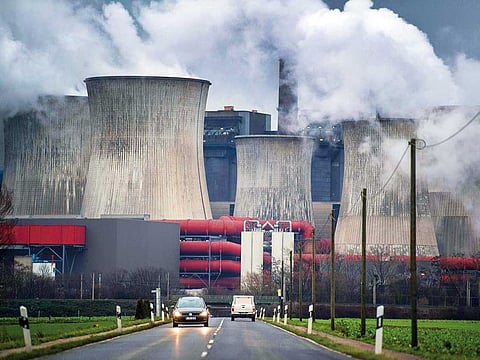Germany should quit coal by 2038, Merkel commission says
Regions impacted by closures should receive €40b to help with transition

Berlin: German Chancellor Angela Merkel’s coal commission will propose quitting the dirtiest fossil fuel in two decades, the latest step in the country’s tumultuous transition to renewable energy.
The commission, appointed by Merkel to set a road map for Germany’s exit from coal, recommends the nation should quit coal by 2038 at the latest, with an earlier exit dependent on construction of renewable-energy infrastructure, according to a statement. Regions impacted by the closures should receive €40 billion (Dh167 billion or $45.6 billion) to help with the transition, the commission said.
The recommendations, subject to amendment by government and parliament, are intended to help Germany make up lost ground in meeting its emissions targets.
“These recommendations, if adopted, will ensure Germany meets is 2030 climate goals,” senior commission member Barbara Praetorius told reporters in Berlin on Saturday.
The commission said Germany should close 5GW of lignite coal plants and 8GW of hard coal plants by 2022. Individual plants set for closure will be decided in talks between the government and utilities like RWE AG and Uniper SE. Lignite is a softer fuel mined in Germany, whereas hard coal is imported.
While renewable energy sources dethroned coal’s dominance of the country’s power mix last year, Germany’s 120-odd coal plants still generated almost 40 per cent of the country’s power last year. The country’s total coal capacity is around 45GW.
Plant closures will take place gradually and impacted regions will receive a combined 40 billion euros ($46 billion) in payments from the federal government to make the transition easier, Deutsche Presse Agentur reported Saturday.
The shutdowns are likely to increase electricity prices for businesses and households, and the commission is looking at mechanisms to ease the burden on consumers.
Environmentalist group Greenpeace, a member of the commission, said the proposals include a pledge to preserve the remainder of Hambach forest — woodlands that utility RWE wants to cut down to continue mining coal there. Chief Executive Officer Rolf Martin Schmitz has previously warned stopping mining the site would cost up to 5 billion euros.
RWE did not immediately respond to a request for comment.
Commission member Michael Vassiliades, head of the IGBCE coal workers union, on Saturday said the commission came to an agreement on how to protect jobs while quitting coal.
“The end of coal will be closely linked to verifiable progress on the future energy mix, the development of renewables and grid networks,” Vassiliades said in a statement.
The proposals, which follow a year of deliberation and lapsed publication deadlines, will be released officially on February 1. Negotiations between the government and power companies will decide which plants will be closed first, with compensation to be paid for prematurely-closed coal facilities.



